MDs Share the Best Menopause Skin Care Routine + Products for Women Over 50
And the things to avoid doing and using while going through menopause

As you hit menopause — and really even years before it fully sets in — your body is going through a transition. You might have more unknowns at this time than you’d like such as hot flashes, mood swings and insomnia. Unfortunately, your complexion may also be in flux. “Menopause is a natural phase in a woman’s life characterized by hormonal changes, particularly a decline in estrogen levels,” says Mona Foad, MD, MHS FAAD, an Ohio-based board-certified dermatologist and founder of MONA Dermatology. “These hormonal shifts can significantly impact the skin, leading to various changes and potential skin issues.” This is where menopause skin care comes in.
“Things that worked for your skin before menopause may not work for you anymore,” says Ryan Turner, MD, a board-certified dermatologist in New York City and co-founder of TRNR Skin. “The products you once loved may be too drying, too sensitizing or too weak.” But if you’re not sure where to start with addressing your new skin issues, you’ve come to the right place. The first step is identifying what’s different about your skin now and then making certain adjustments to counteract those changes. Here, a primer on menopause skin care so you can keep your skin looking as calm, healthy and youthful as possible as this new life stage sets in.
What skin issues arise when going through menopause?
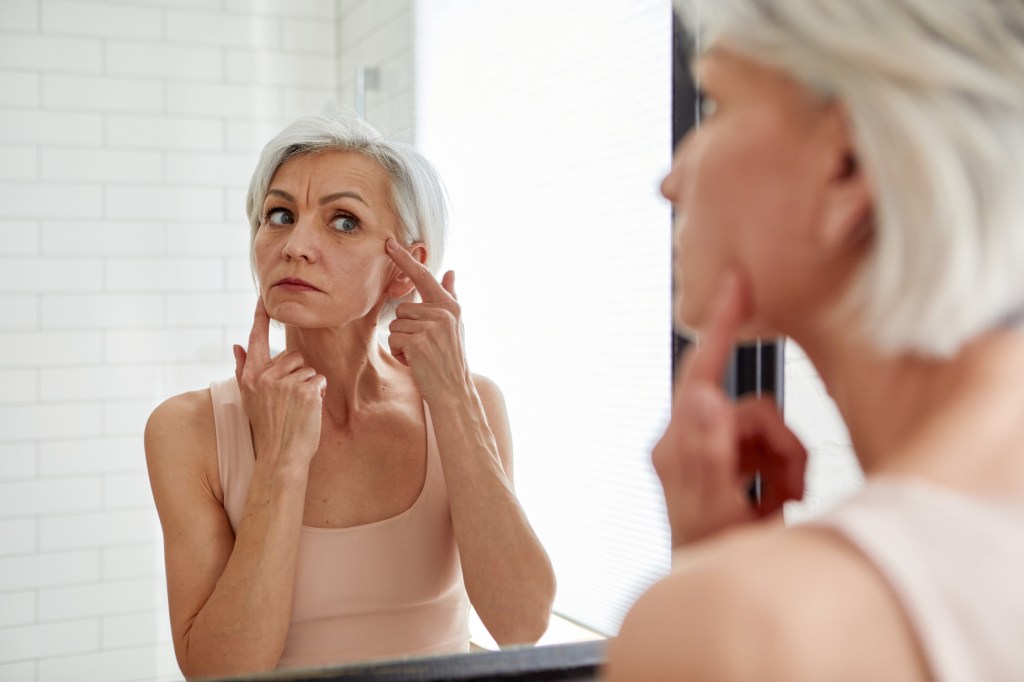
Unfortunately, perimenopause and menopause can wreak havoc on your skin, leaving you feeling dryer than a desert. But, at the same time, skin can revert back to your teenage years again, with acne popping up on your face. In general, you can expect your skin to be thinner, looser and dryer, thanks in large part to the dip in estrogen you’re experiencing.
“Estrogen affects every tissue and organ of the human body, including the skin,” says Tiina Meder, MD, a dermatologist, cosmetic safety expert and founder of Meder Beauty, a microbiome-friendly skin care line. “Estrogen interacts with special kinds of cell receptors called estrogen receptors. These receptors are most abundant around the genital area, lower limbs and the face. So these areas are most vulnerable to reduced levels of circulating estrogen and we observe some very special skin conditions involving this area.”
What exactly are these conditions? The most common perimenopause and menopause skin issues of the face, neck and décolleté are:
1. Hirsutism (or excessive hair growth on the face)
“As estrogen levels decline, there becomes imbalance with levels of androgens, like testosterone, and this disruption to the balance of one’s hormones levels can cause breakouts, the development of facial hair, like chin hairs, and thinning hair,” says Dr. Turner.
2. Acne
In addition to the imbalance with testosterone, “menopause breakouts [can also be] explained by the change of the sebum quality no longer controlled by estrogens,” says Dr. Meder. “This condition affects mostly women with a tendency to have an oiliness of the skin at a young age.”
For more on how acne is common during menopause, watch the below YouTube video from beauty expert Trinny Woodall.
3. Skin thinning and low skin renewal
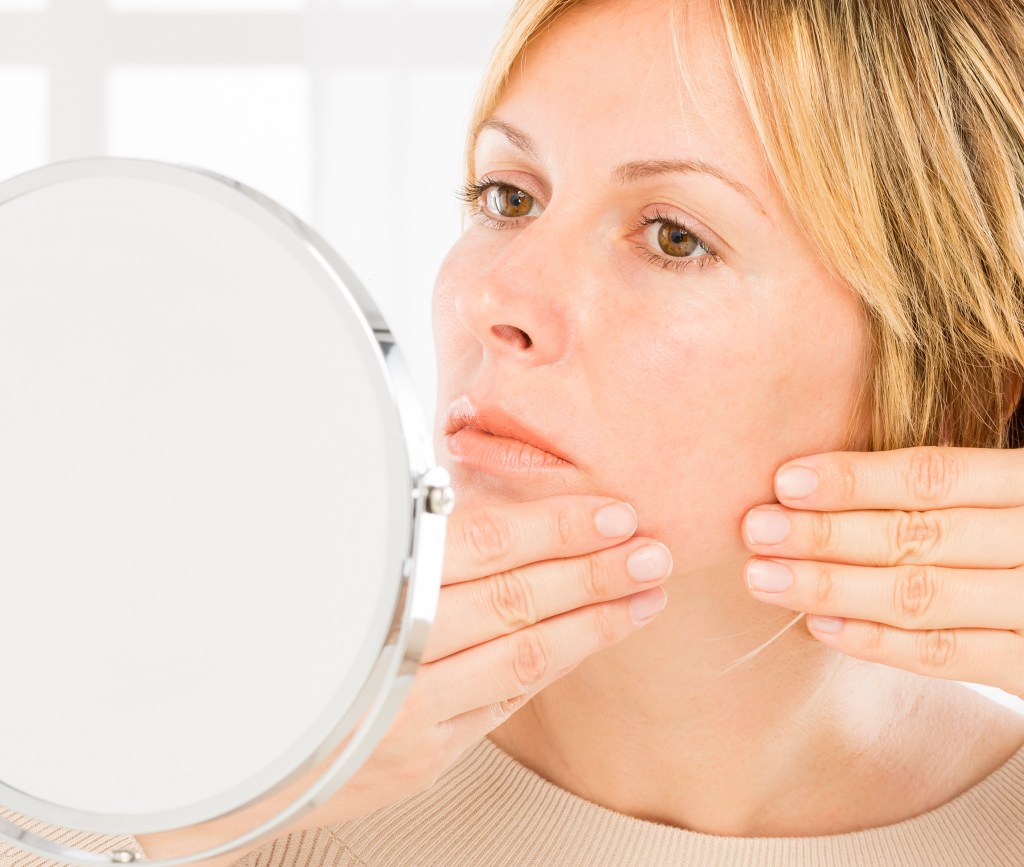
“[This happens] because of the change of the microcapillary system, protected previously by estrogens,” says Dr. Meder.
4. Dryness and heightened sensitivity
“Studies show that the skin barrier’s functionality is impacted by menopause — not only do ceramide levels decrease, so does the quality of these ceramides,” says Dr. Turner. “Ceramides are responsible for helping skin retain water as well as prevent external irritants from getting into the skin. This results in an increase in transepidermal water loss, leaving the skin much drier than it once was as well as more sensitive.”
Other factors may be at play. Dr. Meder suggests a loss of microbiome diversity may contribute to dryness, while Dr. Turner points out that the skin can become more alkaline as aging sets in. ”Increased pH levels in the skin can make skin drier and more sensitive,” he adds.
5. Sagging skin and wrinkles
“Studies have shown that collagen levels drop 30% in the first five years of menopause,” says Dr. Turner. “As a result, skin becomes thinner and weaker, appearing more lax and with more fine lines and wrinkles. Jowling also becomes more noticeable.” Dr. Meder points out that around this time, women begin losing the supportive fat deposits of the face and neck areas, which can have an impact here, too.
6. Flushing and redness
During menopause, women may experience hot flashes with these hormonal shifts,” says Dr. Foad. “Hot flashes can cause flushing, which can lead to persistent redness and rosacea.”
To hear more on menopause skin changes, watch the below video from dermatologist Emma Wedgeworth, MD.
What is menopause skin care?
Menopause skin care can refer to products formulated specifically for the reduced estrogen and collagen levels women experience at this stage of life, like No7 Menopause Skincare Collection and brands such as Womaness and Stripes. Or, more commonly, menopause skin care just means taking care of your skin with the right products to nourish it during this hormonal transition. While exact skincare routines will still look different from woman to woman, searching for certain ingredients in products and incorporating them into your morning and nighttime regimens can help to lessen the effects of the dryness and slack your skin may be experiencing at this time.
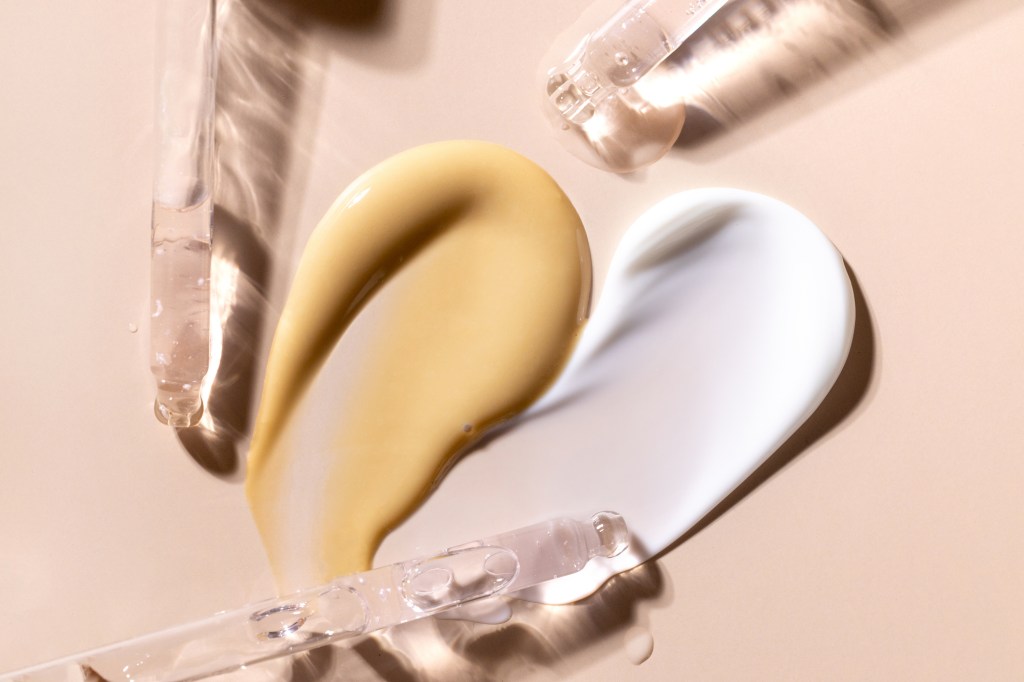
What is menopause skin care not? Turning up the dial with products that, while known for their power to diminish the appearance of wrinkles, age spots and the like, may have always irritated your skin in the first place. “Paradoxically, I don’t recommend using ‘intense’ skincare, which was traditionally recommended for women in menopause,” says Dr. Meder. “It is too aggressive and doesn’t help to restore skin health and microbiome diversity.” She’s referring specifically to retinols and hydroxy acids, which can exacerbate skin dryness and sensitivity, possibly leading to post-inflammatory pigmentation and further wrinkle development. Remember: All mature skin isn’t the same, so working with a dermatologist can help you figure out what your skin can tolerate and benefit from in terms of menopause skin care.
What are the benefits of using menopause skin care?
If you want help controlling or lessening any of the above skin conditions — or possibly avoiding some of them all together — then you’ll want to tap into the benefits of using menopause skin care. First and foremost, menopause skin care can shore up your skin’s natural barrier, alleviating some of its dryness and leading to healthier skin on the whole, especially if you’re dealing with existing skin issues. “If you already manage conditions like eczema, psoriasis or rosacea, they can get worse during menopause,” says Dr. Turner. “Supporting your skin barrier will help protect your skin against external irritants and reduce dryness, so basic moisturization starts to go a long way.”
Relatedly, you might be able to keep breakouts at bay with targeted care of your skin during perimenopause and menopause. “The skin in menopause is much drier, and acne doesn’t relate to the hyperproduction of sebum but mostly to impaired skin barrier, immune system reaction and microbiome changes,” says Dr. Meder. “The best results you can get using gentle microbiome-friendly skincare help to suppress inflammation and restore the skin microbiome’s health.”
While menopause skin care won’t actually turn back the clock, you can expect to see some improvement to things like wrinkles, fine lines and age spots, depending on what products your skin can tolerate and be used consistently. “Incorporate anti-aging serums containing ingredients like retinoids, retinol or prescription-strength retinoids, vitamin C, peptides and niacinamide to target wrinkles, fine lines and age spots,” says Dr. Foad. “These ingredients can help stimulate collagen production, improve skin texture and reduce hyperpigmentation.”
What are the best ingredients to use for menopause skin care?
As early as perimenopause and certainly once you’ve hit menopause and thereafter, it’s a good idea to take stock of what you’re using to better enrich mature skin. Products that contain certain ingredients can potentially help offset your biggest menopausal skincare concerns. Keep reading for the top dermatologist-recommended ingredients.
1. Ceramides
To address the loss of ceramides during this time, you’ll want to find moisturizing products that add them back in. “Skin’s ceramide levels are impacted during menopause, which makes it critical to incorporate them into your skincare routine,” says Dr. Turner. “You’ll want to support the skin barrier and help keep skin hydrated and nourished any way that you can — use humectants like hyaluronic acid and glycerin to draw water into the skin and emollients such as ceramides and jojoba to seal it in.” Dr. Meder calls these types of ingredients “skin-identical” and adds squalane and vitamin E to this list.
2. Chemical exfoliants
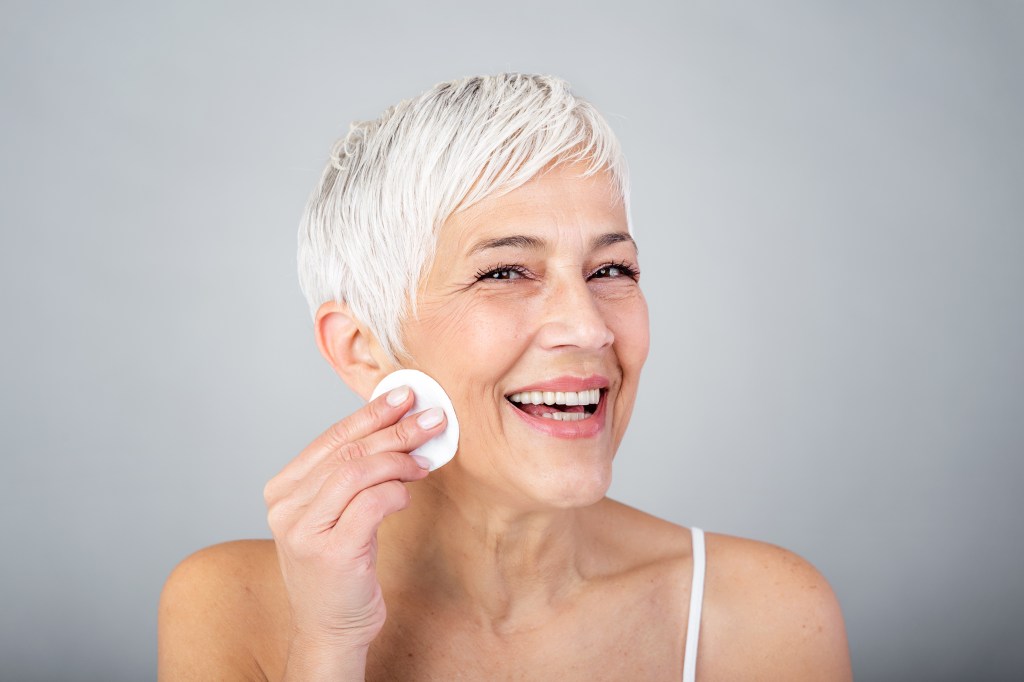
As the years pass by, cellular turnover also isn’t what it used to be either. “Slower cellular turnover makes our skin appear duller, uneven in texture and tone and exacerbates the appearance of fine lines, wrinkles and discoloration,” says Dr. Turner. Though this isn’t solely due to menopause (aging, in general, is part of the equation), key ingredients can be helpful here, too.
“Incorporating chemical exfoliants like glycolic acid to support turnover from the top down by removing those dead cells from the surface, as well as retinoids — which help promote collagen production and support turnover from the bottom up — are very helpful treatments for aging skin,” says Dr. Turner. “Retinoids also help regulate oil production, which can help stave off breakouts.”
How well your skin can still tolerate these types of actives, though, will determine whether some of them end up on your individual “don’t use” list, and Dr. Turner always suggests supplementing any retinoid use with nourishing skin care ingredients. For a gentler approach, Dr. Meder suggests anything with peptides to help with cell turnover, while Dr. Foad says “mandelic acid, lactobionic acid or gluconolactone may be a safer place to start with chemical exfoliants,” if you are more skin sensitive.
3. Antioxidants
“Antioxidants are also important, as they help prevent free radical damage, which is linked to aging,” says Dr. Turner. “I like niacinamide, a B vitamin that also features anti-inflammatory and water retention benefits,” he says. “And vitamin C, which can help promote collagen production as well as combat hyperpigmentation.”
4. Estrogen receptor modulators
Finally, Dr. Meder says selective estrogen receptor modulators can help to increase skin sensitivity to lower concentrations of circulating estrogens. Think substances like soya and red clover extracts, genistein and daidzein, as well as resveratrol, particularly if it’s bio-fermented. Your skin may also respond well to prebiotics, probiotics, postbiotics and metabiotics during perimenopause and menopause, too, says Dr. Meder— in her words, “everything helping to restore the diversity and health of the skin microbiome.”
For an in-depth menopause skin care routine, check out the below YouTube video from skin expert and plastic surgeon Anthony Youn, MD.
The best menopause skin care products
Want to add a few menopause skin care-friendly products to your beauty routine? These dermatologist-approved picks are gentle but effective for perimenopause, menopause and beyond.
Best menopause skin care product to brighten the complexion
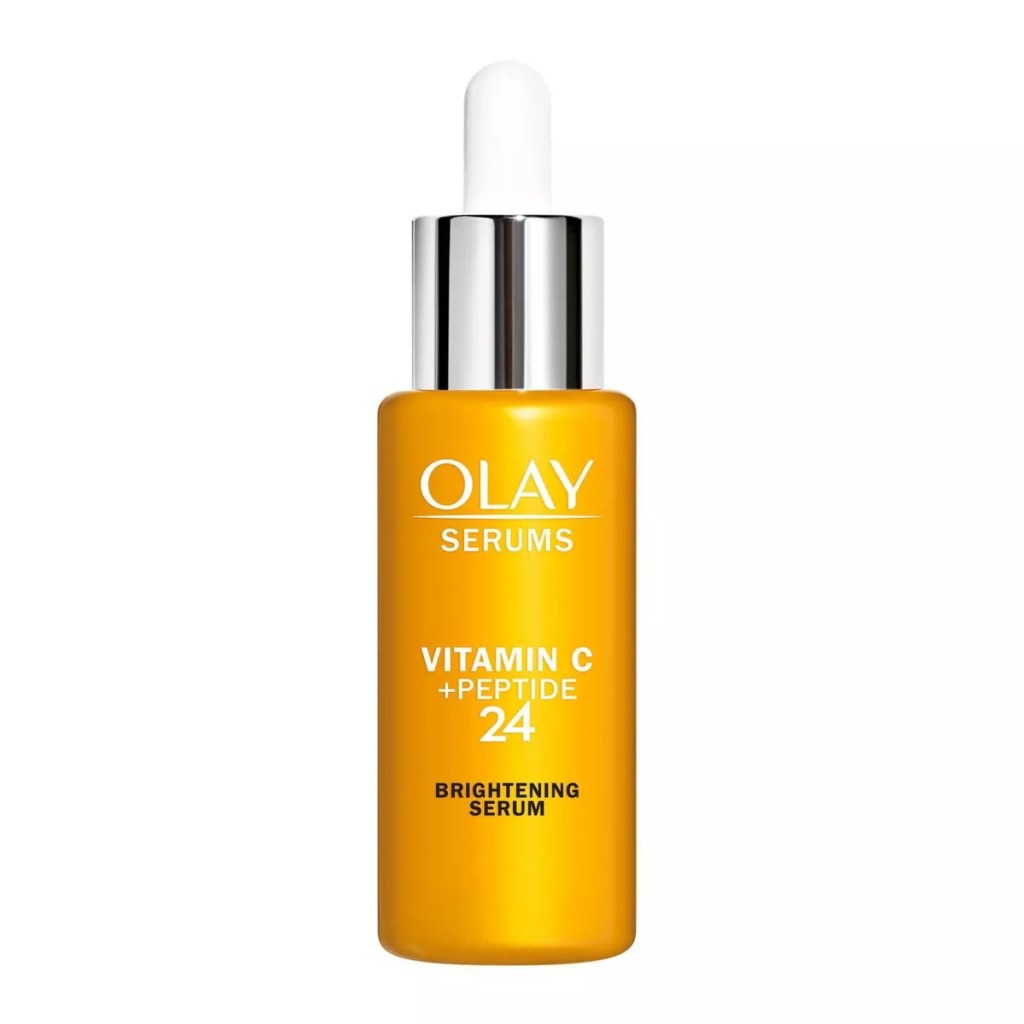
Olay Vitamin C + Peptide 24 Brightening Serum
“I like that this formula not only features niacinamide and vitamin C to promote more resilient, brighter and even-toned skin, but also lactic acid to help improve texture and peptides, which can promote firmer skin,” says Dr. Turner.
Best menopause skin care products to moisturize skin
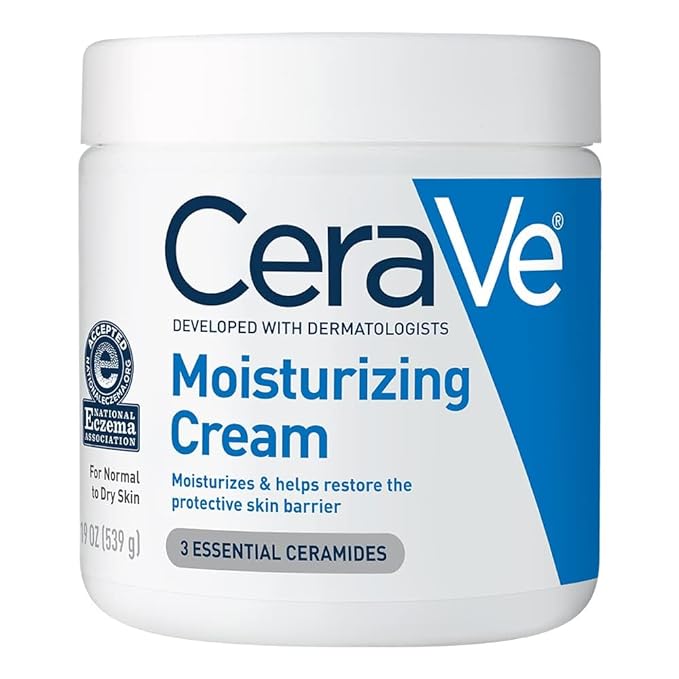
“If you are looking for a fair solution for aged, dry skin in the drugstore, it should be CeraVe moisturizers for sure,” says Dr. Meder. Try the brand’s hero product, the Moisturizing Cream, which can be used for both the face and body. The rich, velvet-like formula contains hyaluronic acid and three different ceramides, of all which work to improve the skin barrier’s integrity. If you want something lighter, CeraVe Moisturizing Lotion may be a better fit texture-wise.
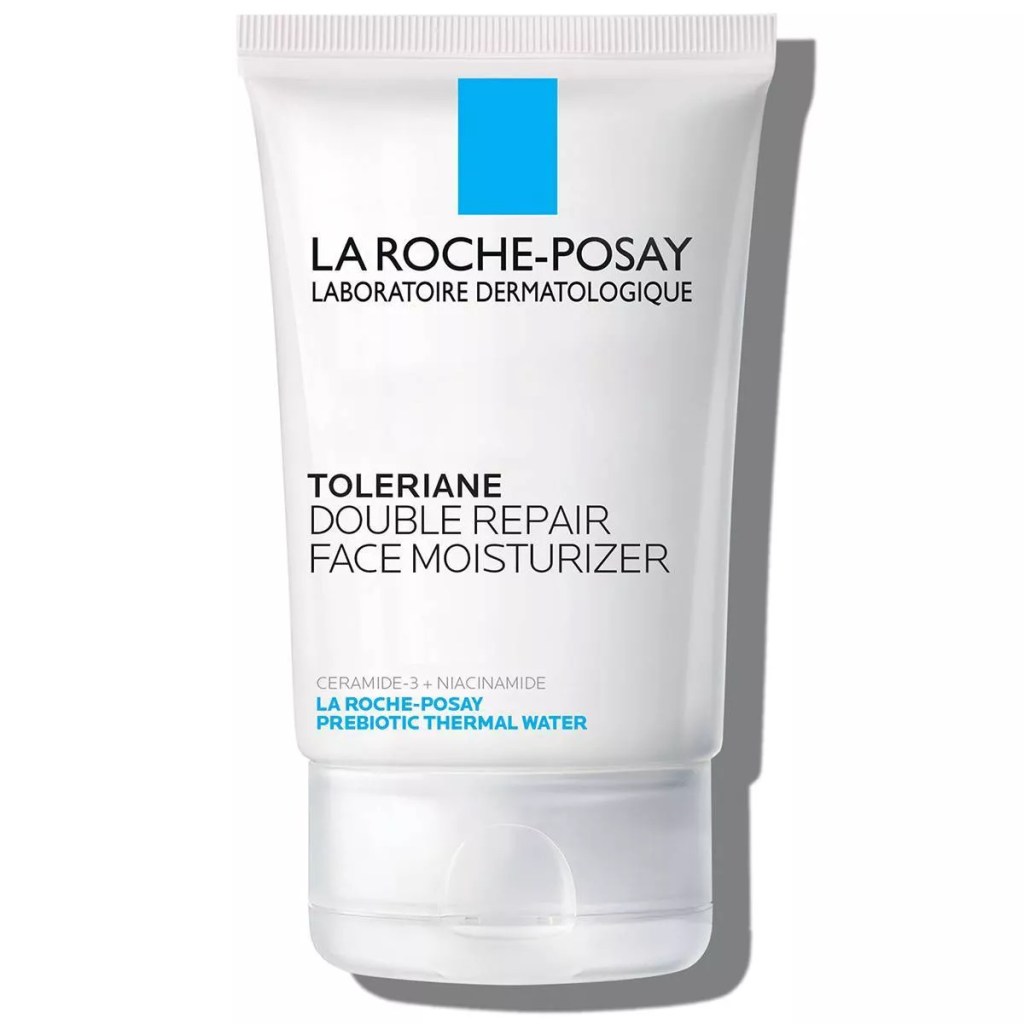
La Roche-Posay Toleriane Double Repair Face Moisturizer
You can’t go wrong with a moisturizer that’s meant for sensitive skin, and this La Roche-Posay cream fits the bill with its light formula. “It contains ceramides, niacinamide and glycerin to strengthen the skin barrier, lock-in moisture and alleviate dryness and irritation,” says Dr. Foad. “This fragrance-free formula is gentle enough for menopausal skin prone to sensitivity and can be used both morning and night to provide long-lasting hydration and comfort.”
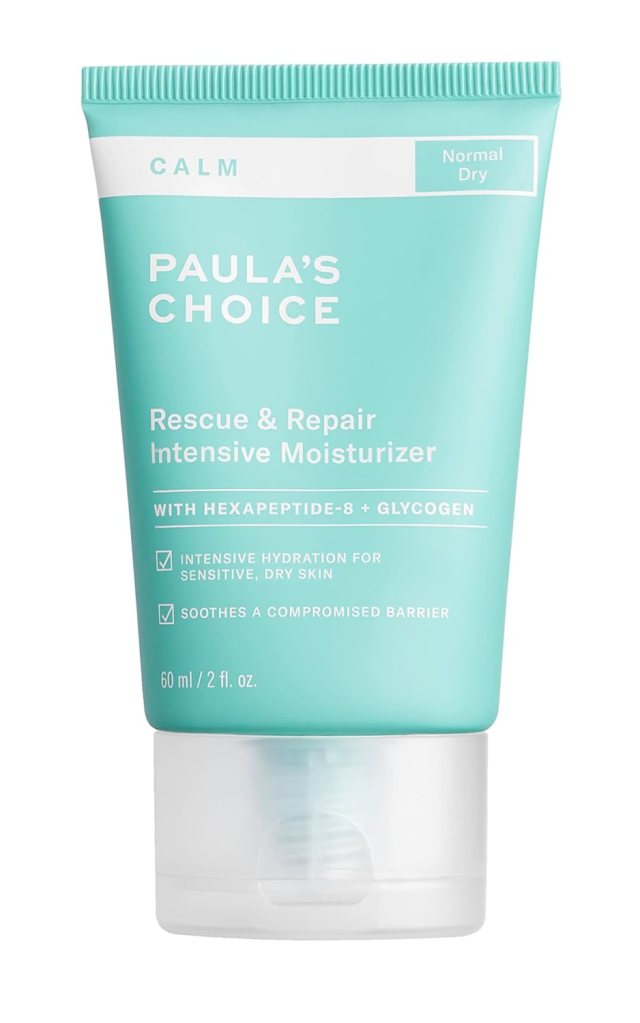
Paula’s Choice Rescue & Repair Intensive Moisturizer
Though it’s a bit on the splurgey side, Paula’s Choice Rescue & Repair Intensive Moisturizer earns high marks for its airy, soothing formula that’s perfect for reactive, menopausal skin. “This product has been one of my favorite moisturizers,” says Dr. Turner. “It contains squalane for very dry and sensitive skin while also allantoin and a mushroom extract that can help calm redness in the skin. In addition, it also contains natural prebiotics to help support the skin microbiome.”
Best menopause skin care product to renew skin
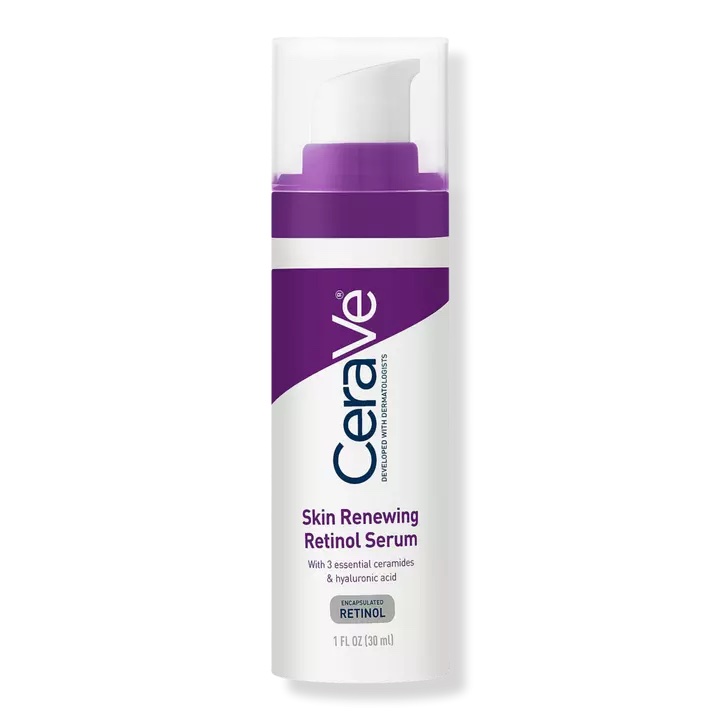
CeraVe Skin Renewing Retinol Serum
If you’re looking for retinol that should cooperate with menopausal skin, Dr. Foad recommends this CeraVe serum. “Retinol helps reduce the appearance of fine lines, wrinkles and age spots by promoting collagen production and increasing skin cell turnover,” she says. “CeraVe’s formulation also includes ceramides, hyaluronic acid and niacinamide to hydrate and nourish the skin.”
Is there anything to avoid skin care-wise when in menopause?
1. Harsh products
You might be tempted to seek out the most intense serums and cleansers, but harsh products are the last thing your skin needs during this transitional time. Instead the goal, Dr. Meder says, is to “help the skin stay calm, moisturized, nourished and happy.” To achieve that, you’ll want to steer clear of anything too aggressive for your skin. “Some things to avoid in your skincare routine when in menopause are harsh cleansers that can strip the skin of its natural oils, and over-exfoliating the skin, as this can disrupt the skin barrier and lead to irritation and dryness,” says Dr. Foad. “Instead, opt for gentle, hydrating cleansers that effectively remove dirt and impurities without compromising the skin barrier or causing further dryness. And limit exfoliation to one to two times per week using gentle exfoliants suitable for mature skin.”
2. Fragrance and dye
Even if you don’t have a fragrance allergy, you may want to choose scent-free formulas. That’s because products with fragrances tend to have higher quantities of alcohol and alcohol can parch mature skin. “Choose fragrance-free or unscented formulations to minimize the risk of skin reactions and avoid skincare products containing high concentrations of alcohol like toners and astringents that can disrupt the skin barrier and exacerbate dryness, leading to increased sensitivity and irritation,” says Dr. Foad. According to Dr. Turner, dyes can be irritating as well, so consider skipping products with artificial colors.
3. Not using SPF
Finally, sun protection is more important than ever, since menopausal skin can be more susceptible to sun damage. That’s why Dr. Foad says to avoid “skipping sunscreen, even on cloudy days or during indoor activities. And choose a broad-spectrum sunscreen with SPF 30 or higher to protect against UVA and UVB rays.”
For more anti-aging skin care tips:
These At-Home Facial Steps Will Leave You With Youthful, Glowing Skin — For Pennies!
The Icy Secret to Glowing Skin, According to Top Skincare Experts















